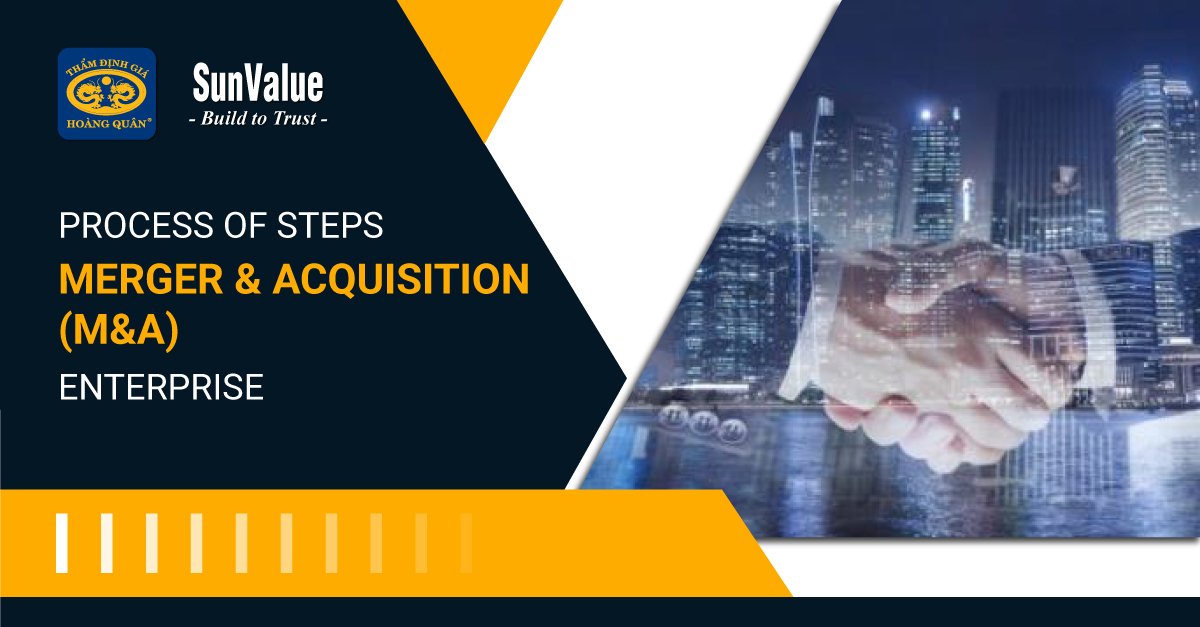PROCESS OF STEPS MERGER AND ACQUISITION (M&A) ENTERPRISE
The process of doing an M&A deal usually takes a lot of time and requires the parties to do it seriously, usually it takes about 6 months to 1 year depending on the size and specific type of business.
Although it may take place with different times, the common point of successful M&A deals is that they usually follow the following M&A implementation processes.
1. Building a strategy for mergers and acquisitions
For the investor (buyer): It is necessary to clearly define the target of the M&A deal such as: How to acquire a business? What is the purpose?. With the seller: Need to merge for what? What does the buyer help with the development path or mission of the business? Clearly identifying the buyer persona will help the seller have a roadmap to build and develop the Enterprise to reach the Buyers goal and obtain the expected selling price of the Enterprise.

2. Search for the target company
Once the objectives of the M&A project have been determined, businesses need to develop specific criteria (business products/services, profit margins, geographical locations, customer segments, etc.) choose the right target companies that are in need of merger or acquisition.
3. Approach the business
When the buyer and the seller have reached an agreement to merge the business. The parties must define the exact type of M&A transaction. This helps to properly apply the corporate law, mechanism and process to conduct transactions, build the framework of M&A contracts, and define the obligations of information and notification to the management agencies of the parties.
4. Legal due diligence of enterprises
After completing the above step, the buyer has the right to request legal and financial information... in order to help the buyer understand the legal status, legal rights and obligations, and the legal regime for the buyer. all kinds of properties, labor contracts, records of land, construction, investment... of the seller. This helps minimize legal risks in corporate M&A projects. This process is usually done by the legal department or an M&A law office on behalf of the buyer.
5. Business valuation
Determine the existing value of the business to be merged, including both tangible and intangible assets. The business valuation requires an independent unit with sufficient legal conditions and expertise to do so to ensure the most objectivity and accuracy.
Commonly used business valuation methods are P/E Ratio, Enterprise Value to Sales (EV/Sales), Replacement Cost, and Discounted Cash Flow (DCF). In which, DCF is the most important tool in determining enterprise value.
6. Negotiate
In fact, there are currently no legal forms or guidelines for all corporate M&A transactions. Therefore, the parties must negotiate and fully develop the terms related to the M&A merger, setting out the requirements, benefits, separate obligations of the business, and "post" M&A issues. .. Otherwise, the M&A contract will lead to internal conflicts when the M&A process ends.
7. Sign the contract
The M&A transfer and merger contract must be approved in writing by the members council (Limited Company) or the shareholders council (Joint-stock company). The contents of the contract include: transfer price, total outstanding debt of the enterprise, buyer or sellers responsibility for the debts, property ownership, labor contract and other contracts. others have signed and not yet done...
8. Change of business registration
To legalize and complete the merger - transfer of businesses, the buyer needs to register with the business registration agency. The buyer can change the business registration with the Department of Planning and Investment with the following contents: Change of members, business lines, registered capital.... This transfer of shares or contributed capital is best shown. in writing certified by a notary public.
9. Handling after M&A
Handling difficult issues after merging two businesses such as: personnel, development plan, mission - vision, corporate culture, operating system, responsibilities of the seller and the buyer of the business. .
Summary: The transfer - merger (M&A) is the process of merging two businesses into one. Therefore, the processes taking place must ensure legal factors and interests of both parties. In which, the appraisal of the value of the business to be merged (the seller) is one of the most important factors determining the value of the M&A deal.
Business Valuation - SunAsset is one of the strengths of Hoang Quan Appraisal Company with more than 19 years of experience in the field of appraisal with an abundant data warehouse, a team of appraisal experts. Professional, highly qualified, fast, strict appraisal process, minimizing appraisal costs... Besides, SUNVALUE service of Hoang Quan Appraisal will provide customers with information about the value of the property. businesses with high reliability for each appraisal purpose.
Related article
- GOVERNMENT REGULATIONS ON VALUATION THE STARTING OF BAD DEBTS
- HOANG QUAN APPRAISAL POINEERS THE DIGITAL TECHNOLOGY APPLICATION IN REAL ESTATE APPRAISAL & COMPREHENSIVE DIGITAL TRANSFORMATION COOPERATION WITH FPT CORPORATION
- Cost Of Valuation Services Most Detailed Year 2020
- HOW TO CHECK PERSONAL CREDIT POINT WHEN BANK LOANS
- CASE TO BAD DEBTS NEED VALUATION
Send request a quote
Please share with us some of your information, we will contact you upon request



 VI
VI